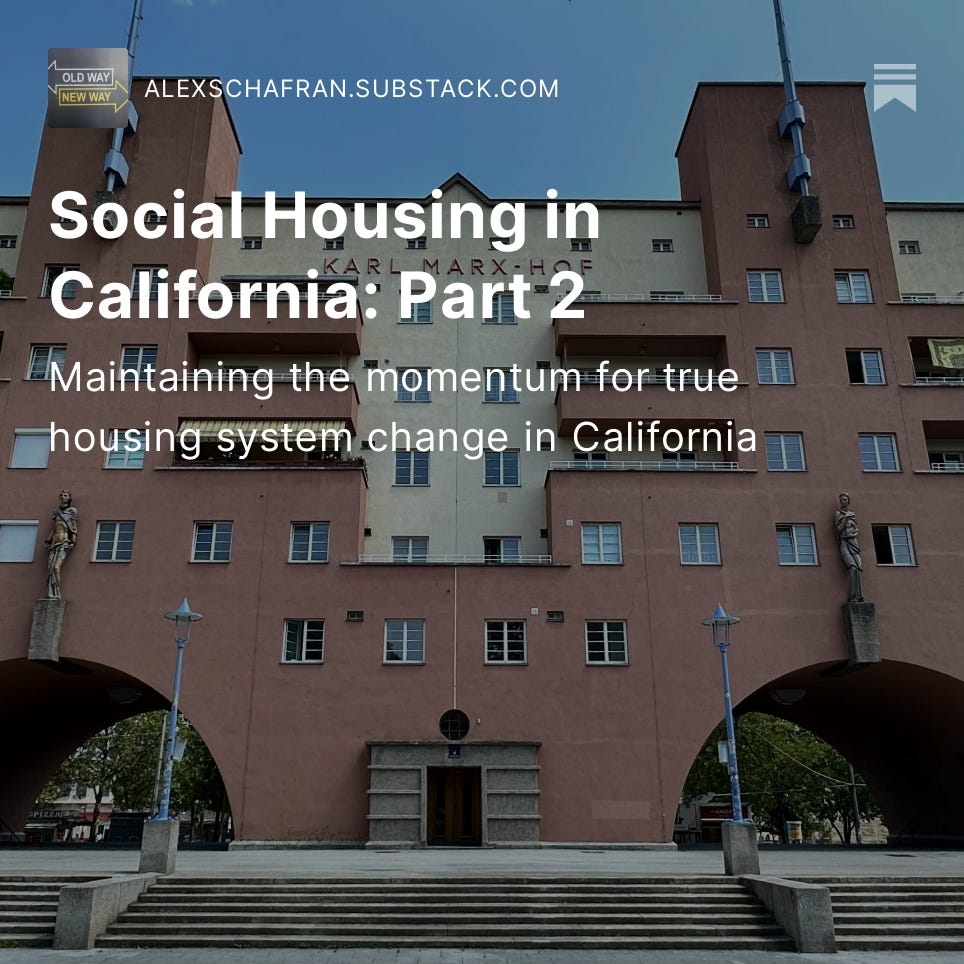About This Episode
Welcome to a special episode of Housing After Dark. The original episode was recorded in May at a webinar sponsored by my Institute for Metropolitan Studies at San Jose State University (SJSU), SJSU’s Institute for Human Rights, and SV@Home. The event featured a conversation with three of my favorite housers in the Bay including Tomiquia Moss from All Home, Jennifer Martinez from the Chan Zuckerberg Initiative, and Regina Williams from our co-sponsors, SV@Home.
The conversion was a wide ranging dive into the hopes, possibilities and need for social housing in California. I was honored to moderate the panel, and since it came at the end of a long affordable housing month just before a long weekend, we figured some of you might have missed it. Now you have an audio and written version and I hope you find it as worthwhile as I did.
A special thank you to SJSU’s Gordon Douglas and Bill Armaline for helping put this event together. You can find their brief intros on the webinar version. One of the reasons why we did this panel was we felt it was important to talk about social housing in California beyond the state legislature. As I explain in my Substack piece accompanying this podcast, it’s going to be critical for housers in the state to keep building momentum behind social housing as an idea, as an idea of doing real system change for housing in California. I hope that the legislature passes both bills before it, ideally as one compromised bill.
I also hope other important bills that can build the backbone of a social housing system make it through this year. But no matter what happens in the state legislature, it will be up to us housers to reimagine, design and build a better housing system in California. That, after all, is what social housing is all about.
This Episode’s Guests
Interview Transcript
Alex Schafran: Social housing is one of those issues where it really helps to take a bit of a deep breath before we start talking. This isn't a today thing or tomorrow thing. This is a longer term vision for transforming our housing system. I think there's a lot of different pathways that we can take, and the willingness to stick with it is really important. I think you can count on me and all the other folks that are here to be part of this issue in these fights moving forward.
First, we're gonna start with a bit of a level set, bring folks up to date with the state of things - why we're talking about social housing. Then, we’ll move into why social housing matters, and the question of what is social housing? One of the challenges and beauties of social housing is that it can mean a lot of different things to a lot of different people. There are a lot of different definitions and understandings out there about what social housing is, as a system, as an idea, as a proposal, potentially as a state agency, etc. Finally, we'll move into the types of actions we hope to see, or that we need to see, for a social housing vision to transform our housing system in some of the ways that social housing voices want to see.
Let's start with context. If you’ve been following social housing in the state of California, you may know that there have been a few legislative proposals over the years. There were a couple of different social housing bills in the previous legislative session, and currently [as of May 26, 2023] there are two bills that call themselves social housing bills. Alex Lee's AB 309 would [have originally stood] up a social housing developer, a California Housing Authority, to build housing in the name of the people of the state of California. There's also SB 555, sponsored by Senator Aisha Wahab (Hayward) which would ask the State Department of Housing and Community Development to study a possible social housing intervention for the state of California. In particular, to find a way to build 1.2 million units of housing for our lowest income California's.
There are also a handful of other bills that many people consider to be social housing bills. There's SB 584, sponsored by the building trades, which would [have] created a new housing fund, using taxes on short term rentals. There is Senator Skinner's SB 440, which would create a framework for all regions in the state of California to have a regional housing finance agency, like the Los Angeles County Affordable Housing Solutions Agency (LACAHSA) agency that is being built in Los Angeles and the Bay Area Housing Finance Agency (BAHFA) that is being built up here in the Bay Area.
You can even go into efforts that the state has made in the previous years, to have teacher housing built, to build housing for students through university funds as part of a social housing shift. This is just a matter of discussion and debate. What's not really a matter of discussion and debate is the fact that more and more people are talking about social housing. One things that really struck me was when I went to an event a few months ago sponsored by our Southern California Associations of Government (SCAG) and San Diego Association of Governments (SANDAG). These are the big regional agencies that together represent around 20 million people in Southern California hosting a discussion on social housing that included local elected officials, local government officials from different small jurisdictions, activists, housing policy wonks, you name it, it had over 400 people talking about social housing in California. Something like that would not have been possible or even imaginable five years ago, and a lot of credit goes to folks in those agencies for being willing to sponsor conversations about social housing. A big shout out to Helmi Hisserich and Jennifer LeSar for helping bring a lot of people to Vienna and really starting to get this conversation running.
And many of you will have read the most recent beautiful piece in The New York Times by Francesca Mari, that has been buzzing around my Twitter. It's been buzzing around conversations that I have with people who I've talked about social housing with for years, and with people who I've never spoken about social housing with once. And that, to me, is an important context.
Jennifer, I know that more people thinking and talking about social housing is something that you have been thinking about, and that you've been part of creating some of this context. I want to get your sense of where you think we are in this current moment of talking and thinking about social housing.
Jennifer Martinez: It is an interesting moment. I’ll admit, I was a skeptic. I was a tenant rights organizer for over a decade. I was really focused on rent control and typical affordable housing stuff. When someone came to me maybe seven years ago and said, “Hey, let's go for social housing.” I was like, “You're crazy. What are you talking about?” It was not at all part of the conversation, one could only wish. I'm too busy trying to keep people from being evicted to worry about a 100 year plan. But here we are thinking about a 100 year plan, which is really exciting.
CZI has sponsored folks to go to Vienna. These trips are happening out of California, New York and other places. These trips are taking cohorts of people abroad, Vienna being the premier place to look at how social housing (and I hope we're gonna get into what we mean by social housing in a second) might look and function and feel to communities and then bring those ideas back into our local communities and our state legislature for further discussion.
We've been part of supporting organizations that ran a ballot initiative last year, the United to House LA ballot initiative, which was passed. What was really exciting about that initiative, among many things (and the fact that it passed at all), was that it included a social housing component. I believe it's the first revenue source that has a specific carve out for the purposes of experimenting with social housing. And on the heels of that, a bunch of folks from LA city, LA, Board of Supervisors and County, are now in Vienna this week doing some more research and now they have the resources to actually try to implement some of those lessons in LA.
The other thing that we're supporting organizations to do such as Housing Now and a few other tenant rights focused organizations who are starting to shift into this question of how do we produce housing for extremely low income people using new tools. They're testing this term social housing. So I think that's the other one of the challenges and one of the things to keep in mind. How are folks trying to do public education around social housing even though the term is ambiguous and not always telling the full story that we want to tell. The other part of the work is narrative context as folks try to figure out how to tell the story.
Alex Schafran: That's a great pivot. Let's talk about what social housing is or what it could be and what it means to you. Regina, what is it about the idea of the possibility of social housing that made you want to and SV@Home want to host this event? For those who don't know, SV@Home is our affordable housing coalition here in Santa Clara County which includes a lot of affordable housing developers and many other housing organizations and housing advocates. What is it about social housing, what does social housing mean to you and why is it important that we're talking about it?
Regina Williams: Social housing, for us, is about housing that is publicly produced, self-sufficient, and serves a mix of household income ranges. One of the reasons we're so supportive and this is so significant, is because housing in general and affordable housing specifically, has been privatized by our federal government. Right now, we have affordable housing and housing in general that's driven mostly by offering incentives or tax breaks. When we're talking about tax breaks, we're talking about benefits that go to the wealthy to disrupt the market or push the market in the ways that we want it to go to make this human right (housing is a human right) available to all of the humans who live in this country. We’re trying to incentivize the market to provide housing for everyone.
We know that our government has not been great at regulating or directing the market to take care of us all. That's what we see today. A lot of folks who don't have access to homeownership. A lot of people don't have access to stable housing in general. There are a lot of ties between wealth building/wealth creation and housing/homeownership, which drives people's decisions about where they live, how much they invest in housing, and drives their desire to exclude others from having access to housing. For me, social housing is really about the government and the public being more invested in making sure that everyone has a home. It’s about decommodifying housing, and the government going as far as to carry out implementation to make sure that everyone has a home.
This is not the first time that the public has been directly involved in making sure that everyone has a place to live in this country. The US Housing Act in 1937, established the United States Housing Authority, which went on to become HUD, and subsequently, in the 80s, we went through an effort of privatizing this public benefit/public good that everyone should have access to. For us at SV@Home, it's really about recognizing the ways that we produce housing for those who are most vulnerable to displacement and most vulnerable to becoming unhoused and to disrupt that with a different model. Large tax credits produce 95% of affordable housing in this country. So really disrupting that and making sure that it's not all about profit motivated individuals (private companies and private equity) delivering the public good and making sure that there's an alternative.
The challenge is the distrust of the government. There’s a reason why we pivoted as a country from public housing and housing production for low income populations. And so there's a true distrust that the government can execute and provide housing for all.
Alex Schafran: Thanks, Regina. I think that last point is so critical, and one that I think we have to really confront especially if we do define social housing in part through the role of the government. I heard you use the phrase “publicly produced housing.” In order to get there, we have to think about the perceptions people have about public housing and social housing. This is a super important question for how to move forward, and I want to come back to that.
Andrew [in the chat] asks how we rebuild faith in the ability of government, not just the federal government, but state and local governments to be effective actors in providing housing. Tomiquia, what for you is the animating force behind the possibility, the idea, the hope, the dream, the vaguely defined world that is social housing?
Tomiquia Moss: I feel like Regina said some really important nuggets that really resonate for me, particularly around the importance of housing in everyone's lives. We have to define housing. Some folks call it a human right. We call it a foundational basic need. Every person who lives in society actually needs a safe and affordable place to live if they're going to be able to reach their full potential in their lives and in our communities writ large.
This idea that the system that we've created in the United States relies so heavily on a market driven solution around housing production discounts the public responsibility to provide that basic need – like education – in order to self actualize in our society. When I think of “social”, that piece to me is the driving definition of what we mean when we say, everyone, regardless of your income, needs that foundational piece. Building on that, our current housing market, policies, [and] the status quo is not producing adequate housing supply for everyone who needs it. Straight up, full stop, that's part of our problem. What's interesting about social housing is that it actually subsidizes supply, not demand. You’re not subsidizing the people, you're subsidizing the asset, the public good. To me, that’s the innovation of social housing. When you actually think about making supply abundant, then people of all incomes can compete for housing. If the government is able to really produce that scale of housing, then that is the institution that should be responsible for financing our housing.
I worked in government for a really long time before I came to the nonprofit sector. I understand the historic barriers to government's leadership around housing, both in their structural, racist roots, and frankly, in the skewed investment (those who have resources getting access to housing benefits, and those most in need do not). I think that there is a paradigm that exists (Vienna being the best example) where this is possible at scale. One of the things I think is important for us to think about is: overlaying social housing concepts and perspective over a housing system that is so inequitable that it's producing the outcomes that our California Housing market produces, I think is a challenge.
I think if we are really going to look at social housing, we have to look at it in the context of a new paradigm, the tax credit environment, the commodification of housing, all of the incentives that real estate investors and hedge funds have and all the things that have a demand side priority. Overlaying a social housing framework on top of that kind of infrastructure will limit the utility of the idea. I'm really interested in thinking about what else paired with some of these concepts and infrastructure would need to change in our broader housing policy in order for Californians to actually get the benefit of having enough housing for all.
I just was looking up a stat around how many renters in the state of California there are, 44% of all Californians rent, and most of those households are rent burdened, meaning they are paying more than 30% of their income to rent. So when I look at social housing models, like the one in Vienna, where renters are not stigmatized, they get stable housing and their full participation in the housing market is acknowledged and they're not demonized for not being a homeowner, I think is dope. So I think we should really be thinking about that piece as well.
Jennifer Martinez: I'm excited about this concept for a couple of reasons, much of which has already been said so I'm going to try to build off of it and not repeat. It’s a concept, to Tomiquia’s point, that's not just nipping around the edges and trying to tweak the current housing system. But it's really trying to reshape a whole paradigm of how we go about fixing a problem that is out of control. It used to be that it was just San Francisco with the problem, then it's Oakland, now it's the Bay Area, maybe sometimes LA. Now across the country, we're experiencing this crisis of housing affordability. The current system premised on the market is incentivized to drive to maximum profits. That’s the fundamental nature of the market drivenness of it, the commodification part of this. At CZI, part of what we do is try to help within the existing market system reduce the cost of housing, whether that's by incentivizing innovative construction approaches, new financing models, etc.
Consistently, what we run up against is the challenge of the incentives of the market to drive to maximum profit. When you think about the banks that are designed to do this, because they have to give returns to their shareholders, the developers have to give a return to their shareholders, the land owner that you buy the land from is trying to get the maximum value so they’re going to hold on to it. Every part of the system is designed for profit maximization.
And, that's how we've set it up. What is exciting about this is thinking about creating a new kind of market, a market that isn't about maximizing profit. A market that is designed to meet need, and only achieve returns up to the level of the cost that it takes to produce the housing itself. On the financing side, what if we could get the public to actually do the financing work and just come back to zero or have a revolving loan fund of sorts, not having shareholders on the other end saying we need maximum profits, we could really produce new kinds of housing that would be affordable to many more people.
We’ve been okay with the externalities of this problem up until pretty recently, because they haven't hit all the income levels. Social housing could be, as Regina had said, an approach to help lots of people across the various kinds of income levels, get the kind of affordable housing that they actually need. So that's exciting and also daunting. How do we actually think about creating a new market system that would be driven by different kinds of incentives?
Alex Schafran: I want to flag up a couple of things before we move into this question about where we go from here, based on a couple of things that Tomiquia and Jennifer just said. Tomiquia mentioned the possibility of getting to scale. I think that's a really important theme that you hear. That’s one of the things that makes Singapore and Vienna so successful is that this is a fully scaled system, that works throughout huge swaths of society and in Singapore, throughout the entire nation.
I’m hearing talk about a new paradigm, more than thinking about social housing as a building or type of development. That’s a really important thing - for me, the most powerful conversations about social housing are about that new paradigm, about reshaping the market. Jennifer, it takes a lot of courage to refer to social housing in some ways as a type of market.
One thing that’s important is that in Alex Lee's [original] version ofAB309, there are both rental options and various forms of homeownership options. It's a mixed tenure approach that recognizes that what individual households want and need is different, but that it valorizes them equally, and it provides the same level of protection and gives people real choice. But the only choice you don't have is to have inadequate, insecure and unaffordable housing, which I don't think it's a choice that any of us would want to make. So I think these are really important things.
There are some proposals that are really centered in building an affordable housing developer - like the Alex Lee proposal, or ones that are focused on housing finance, like some of what Jennifer was talking about. One of the things that's really important about these issues are the incentives that are so problematic in the real estate industry. Some of it has to do with greed, and with culture, and with the exploitation that has been a huge part of our real estate system in the United States from the very beginning.
But a lot of it also has to do with risk. Building housing is a very risky proposition, especially in the United States. One of the reasons why we see people constantly having to push for these higher profits is that they don't trust that they're going to get any profits at all, because the way the system is set up, the whole thing could fall down like a house of cards at any moment. That’s one of the most profound parts of it for me is really thinking about risk and using that public power to get in there and make a system that doesn't have to be as risky. We make our system so much riskier in the United States to build housing and to manage housing than we have to again. If you go to Europe, or Asia or anywhere else in the world that has a better housing system, they use that state power to make the process of developing housing less of a sort of crapshoot, which is how we seem to like it here in the United States.
With this in mind, and with this kind of diverse set of definitions all aiming at something powerful, with these themes of more state action and bolder approaches to deal with what has become a truly profound housing crisis, what are some of the actions that you'd like folks to take? One of the nice things about having the three of you here is that you have both incredibly varied backgrounds in public sector or private sector or not for profit sector, as developers, as funders, as activists, as leaders, as all of the above. Are there things specifically that you'd like different groups to start thinking about and doing differently? What are the steps that we need to be able to get to that new paradigm and get to that scale? And do so let's just say, within our lifetimes?
Tomiquia Moss: It’s such a big question and my mind is just sort of swirling, but I think what comes to mind first is recognizing that we actually need systemic change. There aren't enough programs there. There frankly aren't enough resources in this current housing system that are going to resolve the housing unaffordability for everybody who needs it. We need to be really honest about that. All Home focuses primarily on folks with extremely low income, these are folks who are earning less than $35,000 a year for a household of three, all the way to those who are experiencing homelessness today. The fact of the matter is, the cost that it would take to get enough housing with a deep enough subsidy in this current housing system feels prohibitive. That's why I think so many of our neighbors and residents feel like homelessness is intractable. How are we ever going to get to a place where there's enough housing for everyone when we've under invested in housing for decades across the region?
You now have graduates from San Jose State University, from Stanford, from all public institutions who are now unable to come back to the communities where they grew up, and can’t afford housing rents. One of the takeaways for me is that these challenges will not be met by just investing more money into a system that is producing disproportionately inequitable outcomes. Social housing offers a model that does a system transformation. You actually have a financing system shift that doesn't maximize profit at every point of the life cycle, but enough to be self-sustaining. The Vienna system is self sustaining, it's actually more cost effective in producing housing than we have in the United States. So I think just recognizing that I know change is really scary and change at this scale can feel impossible, because you have to figure out where along the continuum of brokenness you need to disrupt. But I think the overarching theme of social housing as a systemic response to a lot of the housing challenges that we have in the state of California, could really help people get more comfortable around understanding this concept and digging into what kinds of infrastructure changes we would need to make.
I also wanted to lift up the point you made Alex about choice. We want to offer a public option. I feel like this is analogous to the Affordable Care Act where President Obama was trying to be like, “Look, let's give the people an option, right? Let's not just have it all be privatized.” I think this is the same concept, right? If we could build quality housing quickly and much more affordably, I think people could then self select whether or not this is a housing option that they would prefer. And so I really liked the idea of social housing serving a broader range of incomes, but also being able to be an option, if you ended up wanting to buy your own home, you could still do that. But it offers so much more choice for so many more people. I think that's pretty cool.
And then the last thing I'd say is, the state of California has a housing element for every jurisdiction in the country. We have regional housing needs allocation goals, through our process of RHNA in the Bay Area, and we need about 57,000 units of housing over the [next year, or] next eight years for extremely low income households. That, to a lot of jurisdictions and the conversations I have with our partners, feels impossible, both from a cost perspective and a time perspective. Using the social housing construct as a solution set that could be that could actually help deliver that scale of inventory, in a shorter period of time, could be an incentive to shift the conversation for many of our partners.
Alex Schafran: Jennifer, let’s go to you. I’m also going to throw in a particular addition to that question. You helped convince me in prior conversations that the fact that we have these different definitions isn't actually one of the many obstacles to social housing. When you're talking about what we need to do, do you think that we need to coalesce around a particular idea? How do we deal with all of the different ideas that are out there?
Jennifer Martinez: There are probably some principles that would be helpful to agree on. One principle we've already talked about on this call is that it's a different system that's incentivized for different outcomes. But how we get there, given our current conditions, should really be open to a lot of experimentation. I mean, California is a country in itself. So if we’re just even talking about California, leveraging the Bay Area Finance Agency, and its tools to do things like land bank, manage the pipeline of development, maybe start doing financing differently. The LA version of this finance agency and the new revenue source that they [have], these are opportunities for us to really start to experiment and figure out what works under our conditions.
We’re not Vienna 100 years ago, we're the United States today. How do we start to create space for that? One of the things is being able to really do some deep education with folks, with legislators, we've got a new legislative class that just came in, there's going to be another one at the next election. We need to really educate folks around what we are talking about here. What is broken about our system? Why does tweaking it around the edges not work for the long term? Why do we need to think of a new paradigm?
I think there's a question in the chat about affordable housing developers: will they have a role in this system going forward? Absolutely. They're the ones who can physically develop things and wouldn't they love it if they didn't have to rely on low income tax credits that they can't get access to anymore because it's so competitive, and there are so few and they have to do stacked financing of six or eight different sources? And wouldn't they love a different approach to be able to be more efficient, effective, impactful, and at scale? We should have those conversations. I think there's a lot of education to do, and a lot of bringing people into the tent: community land trusts, tenant rights organizations, developers, bankers. There's a big tent to be had here. And that would be my other next thing to do, grow that tent.
Alex Schafran: Regina, I want to throw it back to you on where we need to go from here. Andrew [from the Q&A] asked some really good questions that SV@Home has a lot of great experience in. How do you push social housing in the face of NIMBYism? How do we get affordable housing developers, many of whom have just gotten used to building within the paradigm that we have? How do we generate enthusiasm amongst those who have figured out a way to survive in the existing paradigm to be part of shifting to whatever new paradigm that we're trying to build?
Regina Williams: We all really want the same thing. SV@Home is a membership organization in Santa Clara County focused on bringing everyone together to the table to solve this housing crisis and this crisis of folks being pushed out of their homes and out of the community. Our membership is very broad, including all of the [types of] folks that Jennifer mentioned, and we all ultimately want the same thing. It is clear that we want folks to have the ability to live and thrive in the Bay Area, in this region that has a tremendous economic success, but it's not being shared evenly across the population. We want everyone to benefit from the success of this region, this state, this nation, and be able to live, work, raise their families and be rooted here. And that goes to the average resident. Yes, there are NIMBYs, folks who do not want shared prosperity and do not want to see development in their communities, but they are in the minority. I want to be super clear about that.
When we go out and we collect data, the average person really wants to see their children being able to live here and stay. The folks who are around them in their community, their neighbors, the folks who work at their schools and the different services in their community. They understand that most folks are vulnerable to being pushed out. And the majority of folks want people to be able to have a home, and the stability that comes with having a home that’s affordable. We really try to leverage the fact that we have the same goal.
This new paradigm, that's not easy. Systemic change is challenging. But if we can bring everyone into this movement, knowing that we are aligned, and what we're trying to accomplish, and like Tomiquia said earlier, really understand that we have to have an abundance mindset in order to be able to tackle this challenge, which means thinking outside of the box, and even having to rewire how we think about things.
I do believe that folks will want to be a part of this if it really is achieving our shared goal. Some of the questions that folks have are around specific details. I mentioned the distrust of government, the idea of creating a new state entity. I think a lot of housing challenges and issues are local. There’s a real need for us to do a lot of this work on a local level. We need to pull in local jurisdictions, cities, counties, local housing authorities, folks who have been there and producing public housing and still receive funds to do that to some extent. To be able to look at it from a local level, we need to recognize that there's going to have to be a lot of involvement from neighborhood based non profits and community based organizations on what the challenges on the local level are, and how do we solve those local dynamics.
I think there's a tremendous amount of public will, and that people are looking for new solutions and actually open to them. Folks are looking for new solutions and are in a state of openness. If we are able to present this in a way that folks can understand it, and understand the role that they can play, I think we can get folks there.
Alex Schafran: With the remaining time I want to touch on a few things. An anonymous attendee asks “What about micro housing or container housing?” One of the things you’ll see in most social housing visions is a real diversity of options. It’s a paradigm that is starting to open up possibilities. For instance, one issue for me is the lack of availability of family size, especially multifamily units. That’s something that you do see in other countries, everything from permanent supportive housing and micro units all the way up to family size housing.
Shout out to the Catalyze SV folks who wrote in with a couple of really great questions that I thought we could end on. So one is Alex’s question, which is about “Who do we think are the most powerful or impactful or persistent opponents to social housing?” And since I have a feeling that you may or may not want to name names and throw people under the bus, perhaps another way we could think about that is if somebody is objecting and saying, “Hey, this is the United States. The government can't do this. The California government can't do this, local government doesn't have the capacity.” What would you say to somebody that is a skeptic? Maybe not an outright opponent, but to somebody who's like, “That sounds great. But come on, really? Is this really possible?”
Tomiquia Moss: It’s challenging for people to imagine a California where everyone in our region has housing that they can afford, because it's never been done before. So we are asking people to take the leap of faith to change the sort of bread and butter of their own self interest, whether it's protecting tenants, fighting for homelessness rights, labor wanting to make sure that their members have access to quality jobs. So when we are asking for a system reimagining where we've never been before, I think it's really hard to get all of the stakeholders to take that step together and figure out what do we all collectively need to do differently in order to imagine a system that can serve everyone.
That's fundamentally the challenge, that we don't have the imagination to let go of the way in which we've been doing things, to go in a completely different direction. I'll use the pandemic as an example. The pandemic was one of those moments in our lifetime, when the world had to actually stop and have a response about what to do in these unknown conditions when things were crazy. And amazing things emerged out of that tragedy. I personally worry that the state of housing unaffordability is causing epidemic/pandemic kind of impacts for our entire nation. And so if we could imagine a response that met the moment and the need at scale to transform society's basic need around housing, that's how we allow for things like social housing to blossom, because we cannot look at it from our narrow individual self interests, we must look at it as a transformative moment. And this is a set of tools that can be applied in ways that Jennifer and Regina talked about right now, for us to get closer to that shared vision.
Jennifer Martinez: I love that idea of looking at the way we've transformed other arenas of our lives in response to intolerable circumstances. The fact that we produced a vaccine in a totally fundamentally different way, the fact that we're getting more serious about climate change, we're transforming how we think about energy use. We can do the same thing in housing, we just have to remember that it's possible to transform these systems. We've done it before. And we can do it now.
Regina Williams: The reality is, the way this country was formed was from taking land and from free labor. And there is a lot of prosperity that has come from harming large groups of people. There’s a lot invested in the status quo. It's not just perception, there is actual money and wealth tied to maintaining things just like they are. We have to recognize that to be able to make change, that there are folks who are not going to be as wealthy.
That is the tension of shared prosperity, of making sure that we're no longer extracting from some communities so that others benefit. It really is about changing that dynamic. That's not the history of the United States, so it is hard to imagine. When is enough wealth accumulation and power accumulation enough? Or, when do we all have the numbers to have the power to be able to change it in spite of the .1% or whoever is actually stably housed in this country or has generational wealth? How do we leverage the power of the majority to be able to say, actually we want something totally different? To me, that’s a lot of the challenge.
















Share this post